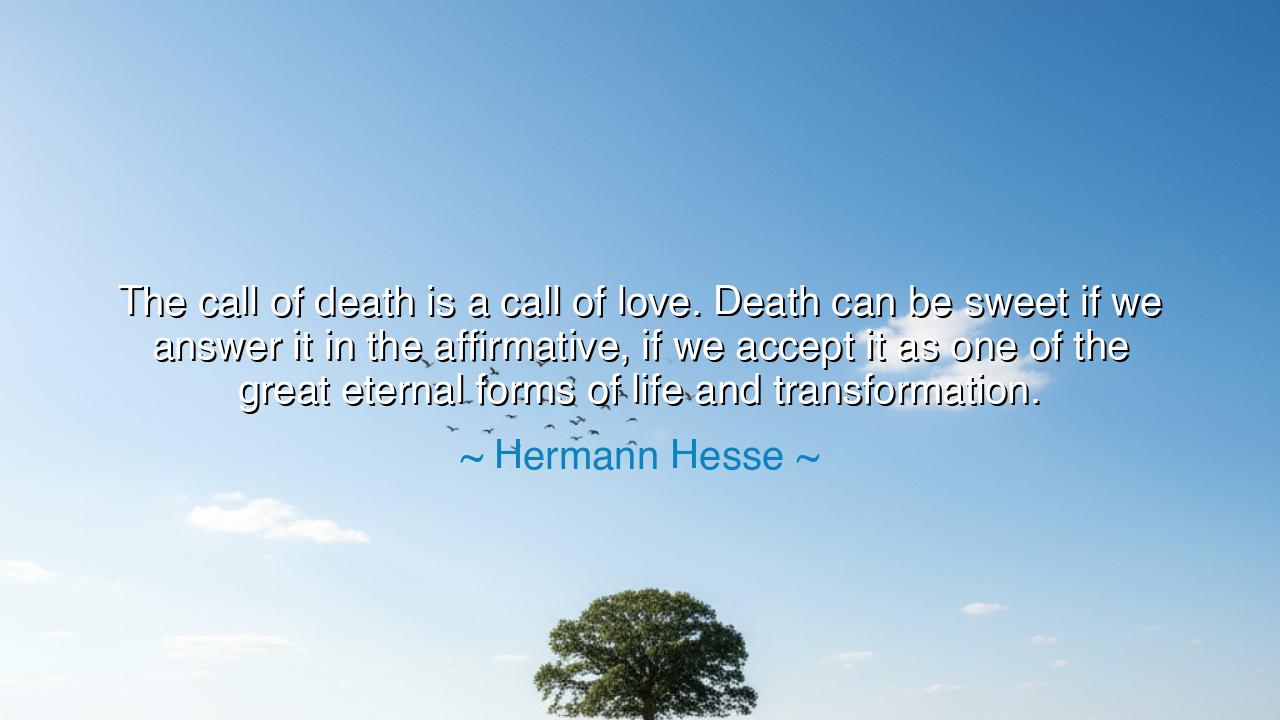
The call of death is a call of love. Death can be sweet if we
The call of death is a call of love. Death can be sweet if we answer it in the affirmative, if we accept it as one of the great eternal forms of life and transformation.






“The call of death is a call of love. Death can be sweet if we answer it in the affirmative, if we accept it as one of the great eternal forms of life and transformation.”
Thus spoke Hermann Hesse, the seeker of the soul, whose words echo like a bell across the vast corridors of human fear and longing. In this saying, Hesse unveils a profound secret: that death is not the enemy, but the beloved messenger of transformation. To those blinded by the terror of endings, death seems cruel and cold; but to those whose hearts are awakened, death is a whisper of love, calling the spirit home to the infinite.
In Hesse’s vision, death and life are not two, but one eternal current flowing through different forms. The same force that gives birth to the child also welcomes the elder into rest. Just as the seed must die to become the tree, and the autumn leaf must fall to nourish the soil, so too must every soul pass through the doorway of death to enter a new phase of being. To accept death is to affirm that the universe is wise, that every ending conceals a deeper beginning. The sweetness of death arises not from surrender to despair, but from trust in the great rhythm of creation.
Consider the tale of Socrates, the philosopher of Athens. Condemned to drink the poison hemlock, he met death with serenity, even joy. When his friends wept, he smiled and said, “Shall we not part as friends? Nothing evil can happen to a good man.” He drank the cup calmly, speaking of the soul’s immortality, believing that death was merely a transition, not an annihilation. In that moment, he answered death in the affirmative—not as a victim, but as a lover of truth. His courage transformed the terror of dying into the beauty of transcendence.
So it is with all who see beyond the veil. To them, death is not darkness but passage. The butterfly does not mourn the loss of the cocoon; it was never meant to remain bound by it. The same divine love that allows us to live also calls us to die, that we may shed the husks of form and move closer to the eternal source. To fear death is to deny the harmony of life; to accept it with love is to recognize the perfection of the whole.
Yet this acceptance is not born in ignorance or blind faith. It is born in the deep contemplation of life itself—in seeing that everything around us is in a constant dance of birth and decay, of creation and dissolution. The river that flows to the sea loses its name but gains eternity. The fire consumes the wood, yet releases its light. So too must we one day let go of the vessel that holds us, trusting that what burns away reveals what cannot die.
Hesse’s wisdom reminds us that love and death are twin gates of the same mystery. Love asks us to lose ourselves in another, to dissolve the boundaries of the self. Death asks the same, but in a grander form—to merge not with one person, but with the infinite. To embrace either is to surrender the illusion of separation. In this surrender lies peace, and in that peace, sweetness.
So take this lesson, O seeker of truth: live in such a way that death finds you ready. Do not turn from it with fear, but greet it as a teacher. Each night as you sleep, you practice dying; each morning as you wake, you are reborn. Let this rhythm remind you that every moment is both an ending and a beginning. Accept change, release what has passed, and give yourself wholly to the present. When your time comes, may you, too, answer the call of death as a call of love, and step through the final threshold not in dread, but in gratitude—knowing that you are returning to the boundless life from which you first came.






AAdministratorAdministrator
Welcome, honored guests. Please leave a comment, we will respond soon